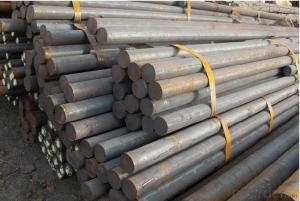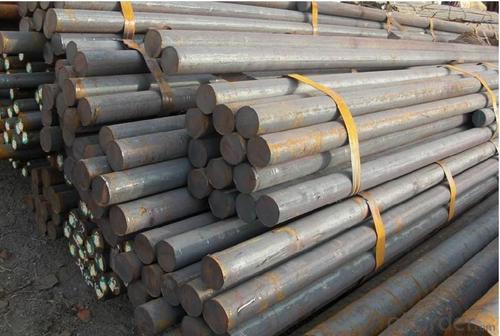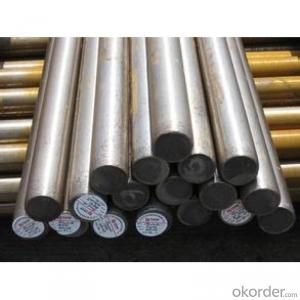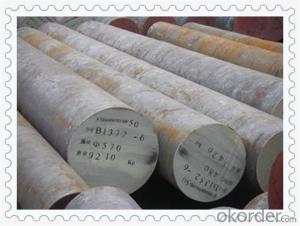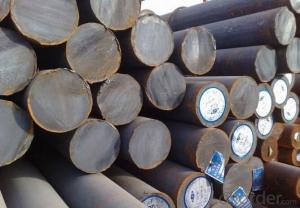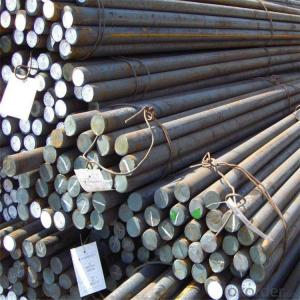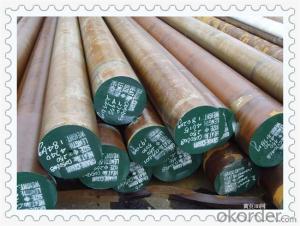ASTM 1020 Low Carbon Steel Round Bars
- Loading Port:
- Tianjin
- Payment Terms:
- TT OR LC
- Min Order Qty:
- 25 m.t.
- Supply Capability:
- 50000 m.t./month
OKorder Service Pledge
OKorder Financial Service
You Might Also Like
Specification
ASTM 1020 Low Carbon Steel Round Bars
Product Description
1. Steel grade: ASTM1020, 20#, C22, S20C
2. Length: 6M-12M
3. Diameter: 16mm-300mm
4. Product range: round bar, flat bar, square bar
5. Technique: Hot rolled, forged, cold drawn
Specification:
Material | ASTM 1020 | Round bar | Dia(mm) | 16-300mm |
Process | EAF + LF + VD + Forged + Heat Treatment (optional) | Length (mm) | Max 12m | |
Heat treatment | Normalized / Annealed / Quenched / tempered | Flat bar | Thickness(mm) | 8-500mm |
Delivery condition | Hot forged +Rough machined (black surface after Q/T)+ Turned (optional) | Width(mm) | 70-200mm | |
Test | Ultrasonic test according to SEP 1921-84 D/d | Length (mm) | Max 12m |
Chemical Composition:
C | Si | Mn | Cr | Ni | Cu |
0.17~0.23 | 0.17~0.37 | 0.35~0.65 | ≤0.25 | ≤0.30 | ≤0.25 |
Packing and Delivery:
Packing in bundle package, or as customer's requirements.
Delivery Detail: 45 days after receiving the deposit.
Usage and Applications
1. Steel round bar is used in a large number of architectural and engineering structures. Or it can be used in construction of plants for the production of steel house frames, high-voltage transmission towers, bridges, vehicles, boilers, containers, ships, etc.
2. And we can use this kind of product on the performance of the mechanical parts if the demand is not very high.
3. Some special material steel round bar can be used for main shaft of steamer, hummer shank, with big section and supper force.
Product Show:
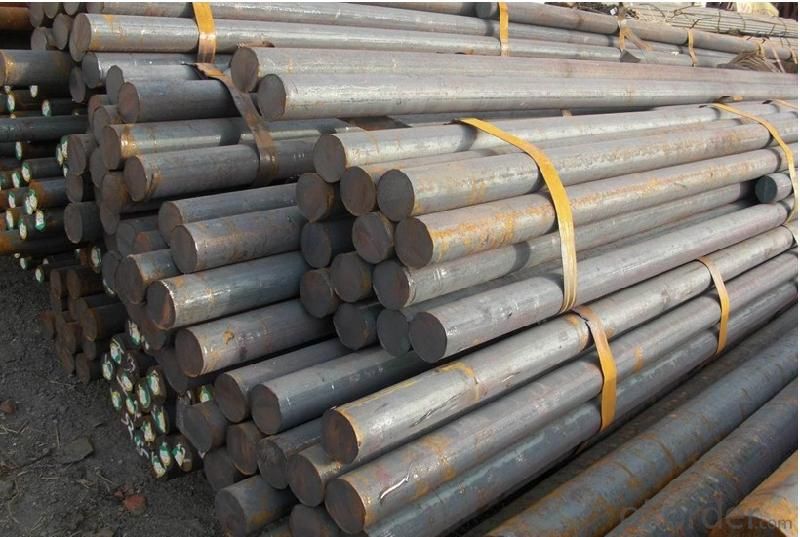
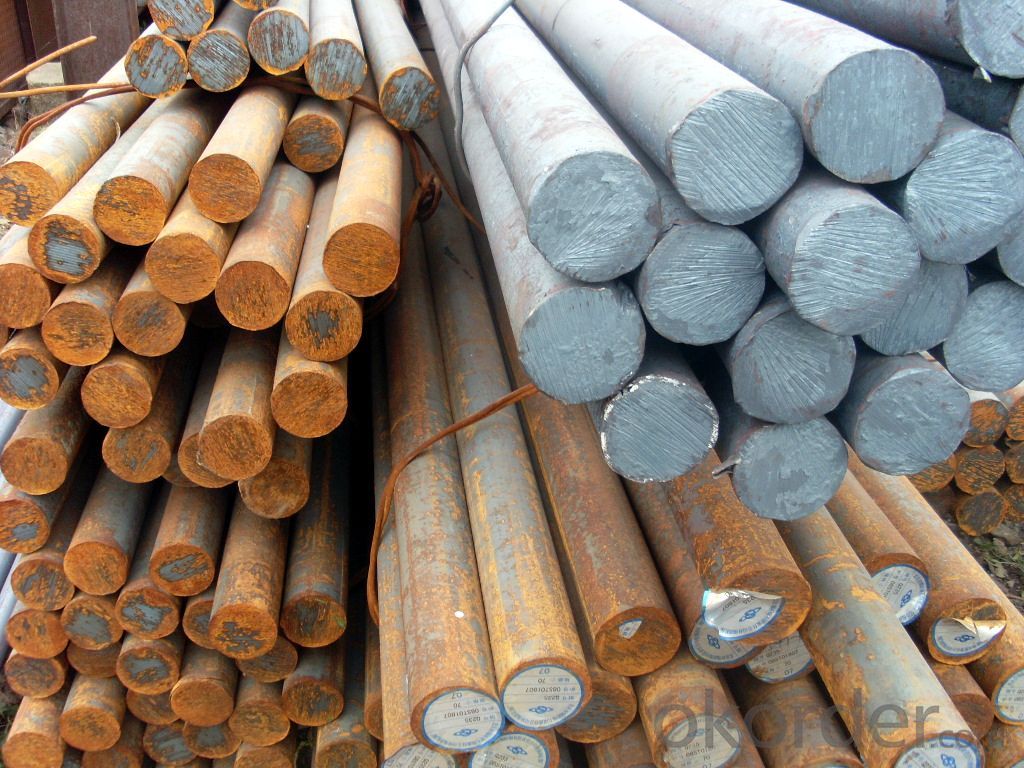
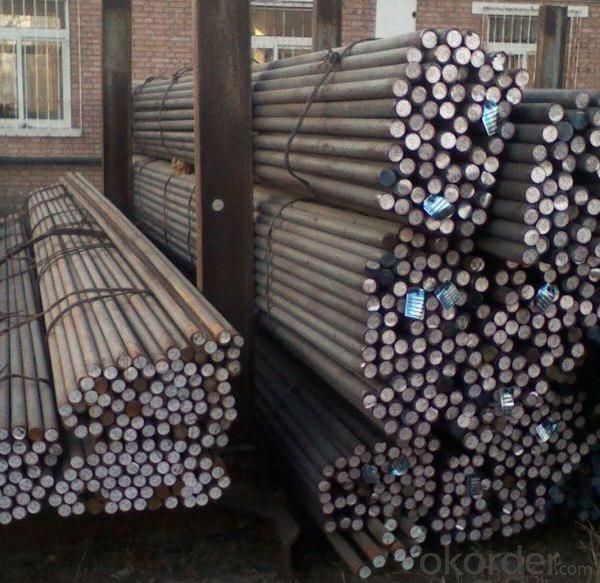
- Q: What are the challenges in machining special steel?
- Machining special steel poses several challenges, including its high hardness and toughness. Special steels are typically designed to have enhanced properties, such as wear resistance or high strength, which makes them more difficult to machine compared to regular steels. The high cutting forces required and the rapid tool wear during machining are major challenges. Additionally, special steels often have low thermal conductivity, leading to increased heat generation during machining, which further exacerbates tool wear. Therefore, specialized cutting tools, cooling techniques, and machining parameters need to be carefully considered to overcome these challenges and achieve optimal results when machining special steel.
- Q: How does special steel contribute to the power generation industry?
- Special steel plays a crucial role in the power generation industry by providing the necessary strength, durability, and resistance to extreme conditions. It is used in the manufacturing of various components such as turbine blades, boilers, and heat exchangers, which are essential for generating electricity. Additionally, special steel alloys offer excellent corrosion resistance, ensuring the longevity and reliability of power plants.
- Q: How does special steel contribute to the construction machinery industry?
- Special steel plays a crucial role in the construction machinery industry by providing high-strength and durable components. These components are essential for heavy-duty applications in construction machinery, such as excavators, bulldozers, cranes, and loaders. One of the key contributions of special steel to the construction machinery industry is its ability to withstand extreme stress and load-bearing requirements. Construction machinery often operates under severe conditions, including heavy loads, vibrations, and impacts. Special steel, with its excellent mechanical properties, can resist these conditions and maintain its structural integrity, ensuring the safety and reliability of the equipment. Moreover, special steel is often used in critical components of construction machinery, such as booms, buckets, tracks, and gears. These components are subjected to intense wear and tear due to constant use in harsh environments. Special steel, engineered with enhanced hardness and wear resistance, helps extend the lifespan of these components, reducing maintenance costs and downtime. Additionally, special steel provides superior corrosion resistance, which is vital for construction machinery used in humid or corrosive environments. By preventing rust and decay, special steel helps maintain the equipment's performance and longevity, ultimately increasing productivity and efficiency in construction projects. Furthermore, special steel enables the construction machinery industry to achieve innovative designs and advanced functionalities. Its versatility allows for the creation of complex shapes and precise tolerances, which are essential for optimizing the performance and efficiency of machinery. Special steel also enables the incorporation of advanced technologies, such as sensors and automation, enhancing the accuracy and productivity of construction equipment. In summary, special steel contributes significantly to the construction machinery industry through its ability to withstand extreme conditions, provide superior wear resistance and corrosion protection, and enable innovative designs. By utilizing special steel in the manufacturing process, construction machinery manufacturers can ensure the durability, safety, and efficiency of their equipment, ultimately benefiting the construction industry as a whole.
- Q: What are the properties of alloy steel?
- Alloy steel is a type of steel that contains additional elements, such as chromium, nickel, or molybdenum, which enhance its mechanical properties. These alloys impart increased strength, hardness, and resistance to corrosion, making alloy steel suitable for various applications. It typically exhibits excellent toughness, durability, and wear resistance, making it ideal for use in construction, automotive, and machinery industries. Additionally, alloy steel can be easily heat treated, allowing for further customization of its properties to meet specific requirements.
- Q: What is the significance of special steel in the medical field?
- Special steel, which is also referred to as medical grade steel, holds a vital role in the medical field due to its distinct properties and importance. Specifically designed and produced to meet the strict requirements of the healthcare industry, special steel's significance in the medical field can be grasped through the following points: 1. Biocompatibility: Special steel demonstrates biocompatibility, meaning it is non-toxic and does not elicit an adverse reaction when it comes into contact with the human body. This makes it an ideal material for medical devices like surgical instruments, implants, and orthopedic tools. 2. Resistance to corrosion: Special steel exhibits high resistance to corrosion and rust, ensuring the endurance and durability of medical instruments. Instruments used in surgical procedures require repeated sterilization, and the corrosive nature of sterilization agents can degrade ordinary steel. Special steel, with its superior resistance to corrosion, can withstand these harsh conditions, decreasing the risk of contamination and preserving the integrity of medical equipment. 3. Mechanical properties: Special steel possesses exceptional mechanical properties, such as high strength, toughness, and ductility. These characteristics are crucial for medical devices as they need to endure the stresses and strains of surgical procedures, maintain their shape, and deliver reliable performance. 4. Compatibility with sterilization: Special steel can withstand various sterilization methods, including steam sterilization, ethylene oxide sterilization, and gamma radiation. This guarantees that medical instruments made from special steel can be effectively sterilized, preventing the transmission of infections and minimizing the risk of contamination during surgeries. 5. Precision manufacturing: Special steel can be shaped into intricate forms and sizes, enabling the production of precise medical instruments. Its superior machinability allows for the creation of fine and sharp edges, which are vital for surgical tools used in delicate procedures. 6. Antibacterial properties: Certain special steels, such as stainless steel, possess inherent antibacterial properties. This characteristic is particularly crucial in the medical field, where preventing infections is of utmost importance. Instruments made from antibacterial special steel can hinder the growth of bacteria, minimizing the risk of post-operative complications. In conclusion, the significance of special steel in the medical field lies in its biocompatibility, resistance to corrosion, mechanical properties, compatibility with sterilization, precision manufacturing, and potential antibacterial properties. These qualities render special steel an indispensable material for the manufacturing of medical devices, ensuring their dependability, durability, and safety for both healthcare professionals and patients.
- Q: How is nitriding steel used in the manufacturing of engine components?
- Nitriding steel is used in the manufacturing of engine components to improve their hardness, wear resistance, and overall performance. The nitriding process involves diffusing nitrogen into the surface of the steel, forming a hard layer of nitrides. This increases the component's resistance to abrasion, corrosion, and fatigue, making it more durable and long-lasting. Additionally, nitrided steel has high heat resistance, which is crucial for engine components exposed to high temperatures and friction. Overall, the use of nitriding steel in engine manufacturing enhances the reliability and efficiency of the engine, leading to improved performance and longevity.
- Q: How does special steel perform in cryogenic applications?
- Special steel is renowned for its exceptional performance in cryogenic applications, characterized by extremely low temperatures that fall below -150 degrees Celsius (-238 degrees Fahrenheit). Unlike regular steel, which tends to become brittle and weaker in such conditions, special steel, also referred to as cryogenic steel or low-temperature steel, is specifically engineered to withstand these extreme cold temperatures. One of the key advantages of special steel lies in its ability to maintain its mechanical properties even at cryogenic temperatures. It retains its strength, toughness, and ductility, enabling it to endure the stresses and strains imposed on it in cryogenic environments. As a result, special steel finds application in various fields, including aerospace, energy, and healthcare, where it is used in cryogenic storage tanks, pipelines, and equipment. Another significant feature of special steel is its excellent resistance to brittle fracture at low temperatures. This is of utmost importance since brittle fractures occur when materials become excessively brittle and fail under stress. The distinct composition and processing methods employed in special steel help prevent such fractures, ensuring the integrity and safety of components within cryogenic systems. Furthermore, special steel possesses a low coefficient of thermal expansion, meaning it undergoes minimal dimensional changes when exposed to temperature fluctuations. This characteristic proves highly advantageous in cryogenic applications as it preserves the stability and reliability of equipment and structures. Additionally, special steel exhibits commendable corrosion resistance, which is vital in cryogenic environments where the presence of moisture and certain chemicals can accelerate corrosion processes. By resisting corrosion, special steel enhances the longevity and durability of components, thereby reducing maintenance and replacement costs. In conclusion, special steel is the preferred choice for cryogenic applications due to its ability to maintain mechanical properties, resist brittle fracture, display low thermal expansion, and exhibit corrosion resistance. These properties render it a dependable and efficient material for use in cryogenic systems, providing the necessary strength and durability even under extremely low-temperature conditions.
- Q: How does sulfur affect the machinability of special steel?
- Special steel can be affected by sulfur in both positive and negative ways. On one hand, when a small amount of sulfur is added, it acts as a free-machining element. This leads to the formation of sulfide inclusions, which aid in breaking chips during machining. As a result, the surface finish is improved, tool wear is reduced, and cutting speeds are increased. This is particularly advantageous for high-speed machining operations. On the other hand, excessive sulfur content can be detrimental to machinability. When sulfur levels are high, brittle sulfide inclusions are formed, leading to poor machinability and decreased mechanical properties. This can cause increased tool wear, inferior surface finish, and slower cutting speeds. Additionally, sulfur can contribute to the development of built-up edge, further hindering the machinability of special steel. Therefore, maintaining an optimal sulfur content is crucial in order to achieve a balance between improved machinability and the desired mechanical properties. Proper control of sulfur levels in the steel composition, along with the use of appropriate machining techniques and tool selection, is necessary to achieve efficient and high-quality machining of special steel.
- Q: How does special steel contribute to improving product safety?
- Special steel contributes to improving product safety in several ways. Firstly, special steel is known for its high strength and durability, making it ideal for manufacturing components that need to withstand extreme conditions or heavy loads. This ensures that products made with special steel are less likely to fail or break, reducing the risk of accidents or injuries. Secondly, special steel can be engineered to have specific properties such as corrosion resistance, fire resistance, or impact resistance. By incorporating these properties into the design and production of products, special steel enhances their safety features. For example, in the automotive industry, special steel is used to manufacture reinforced frames and safety components, providing better protection to passengers in case of collisions. Additionally, special steel is often used in critical applications where reliability and precision are paramount, such as medical equipment, aerospace components, or industrial machinery. The high performance and consistency of special steel ensure that these products function as intended, minimizing the chances of malfunctions or failures that could jeopardize safety. Overall, the use of special steel in various industries contributes to improving product safety by enhancing strength, durability, resistance to external factors, and reliability.
- Q: What are the key characteristics to consider when selecting special steel?
- There are several key considerations to keep in mind when choosing special steel. Firstly, the composition of the steel is of utmost importance. The elements and their proportions within the alloy play a vital role in determining the steel's properties, such as strength, hardness, and resistance to corrosion. It is essential to carefully assess the intended use and select a composition that aligns with the desired performance. Mechanical properties are another critical aspect to consider. Tensile strength, yield strength, ductility, and toughness all determine how the steel will perform under different loads and impacts. Choosing a steel with appropriate mechanical properties for the specific application is crucial. The steel's heat treatment capabilities should also be taken into account. Special steels often undergo various heat treatment processes to enhance their properties. Factors like hardenability, tempering ability, and the ability to maintain hardness at high temperatures are essential factors to consider when selecting special steel. Corrosion resistance is a significant characteristic, particularly if the steel will be exposed to harsh environments or chemicals. Certain special steels are specifically designed to have excellent resistance to corrosion, making them suitable for applications in marine environments, chemical processing plants, or the oil and gas industries. Other characteristics to consider include machinability, weldability, and cost. Machinability refers to how easily the steel can be cut, drilled, or shaped, while weldability determines the steel's ability to be welded without compromising its properties. Cost is an important factor that should align with the project's budget constraints. To summarize, when choosing special steel, it is crucial to consider the composition, mechanical properties, heat treatment capabilities, corrosion resistance, machinability, weldability, and cost. By assessing these key characteristics in relation to the specific application, one can make an informed decision and select the most suitable special steel for the intended purpose.
Send your message to us
ASTM 1020 Low Carbon Steel Round Bars
- Loading Port:
- Tianjin
- Payment Terms:
- TT OR LC
- Min Order Qty:
- 25 m.t.
- Supply Capability:
- 50000 m.t./month
OKorder Service Pledge
OKorder Financial Service
Similar products
Hot products
Hot Searches
Related keywords
